On 13 August 2004, a bill that enshrined the meaning of marriage as between man and a woman was passed into Australian law.

Titled the Marriage Amendment Act 2004, the bill wrote into legislation what was already written in common law: that marriage meant the union of a man and a woman.
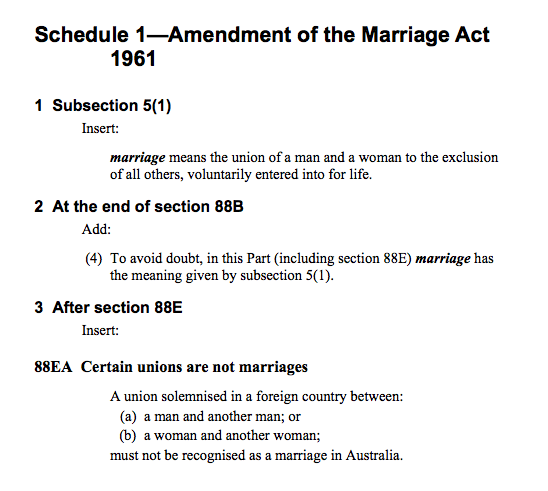
The amendment was proposed by the Howard government, and supported by the Labor opposition.
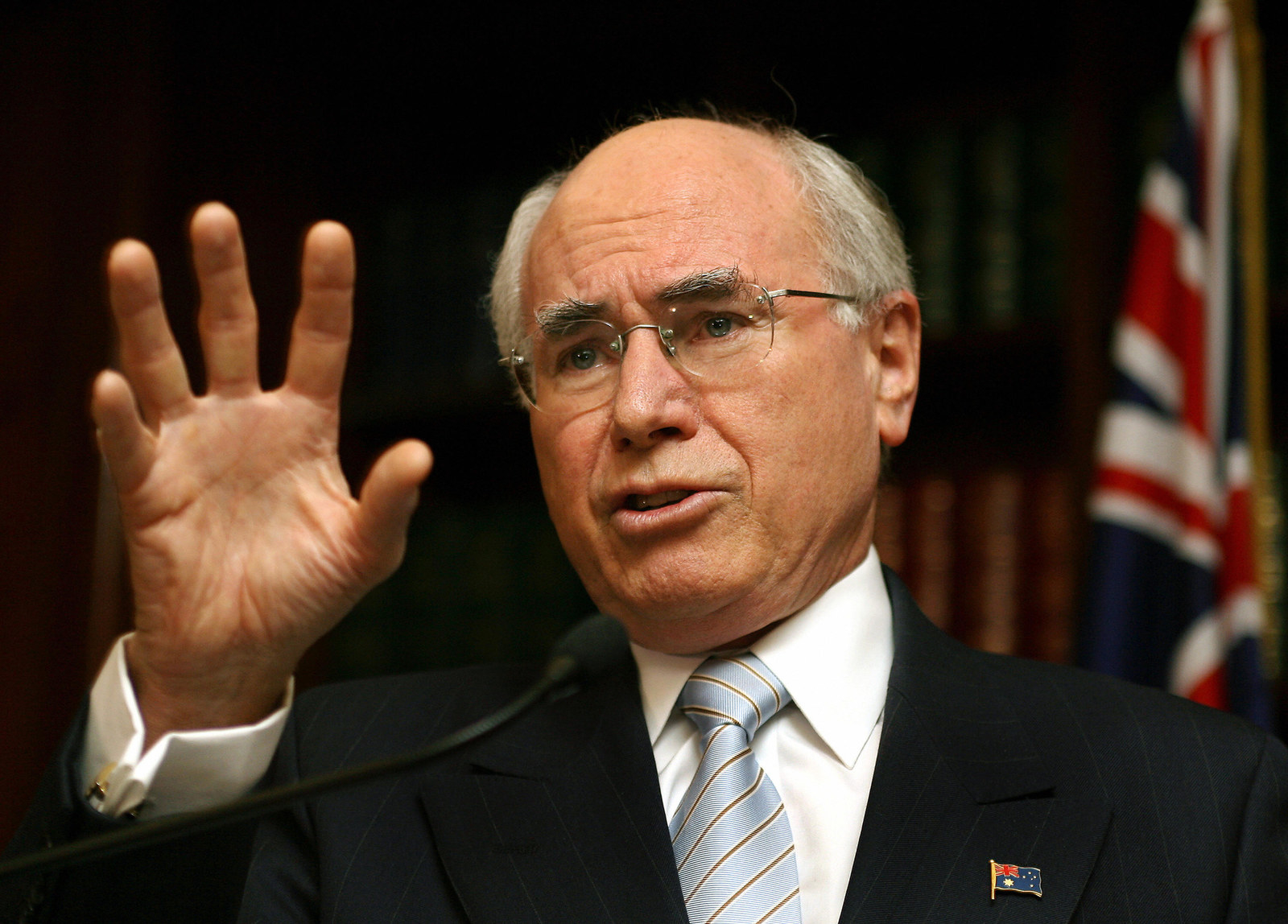
"This bill is necessary because there is significant community concern about the possible erosion of the institution of marriage," said then attorney general Phillip Ruddock as he introduced it on May 27.
Shadow attorney general Nicola Roxon said the proposed marriage amendments "merely confirm existing law and [Labor's] previous commitments to keeping marriage as a heterosexual institution".
However, several Labor politicians expressed their dissatisfaction with the bill, despite being bound to vote in favour of it. These MPs included Tanya Plibersek, Anthony Albanese, and Penny Wong.
The Australian Democrats and the Greens voted against the bill, saying it was discriminatory and divisive.
A 2004 Newspoll commissioned by SBS found 44% of Australians opposed same-sex marriage at the time, 38% were in favour, and 18% were undecided.
Here are some excerpts from the debate in the House of Representatives...
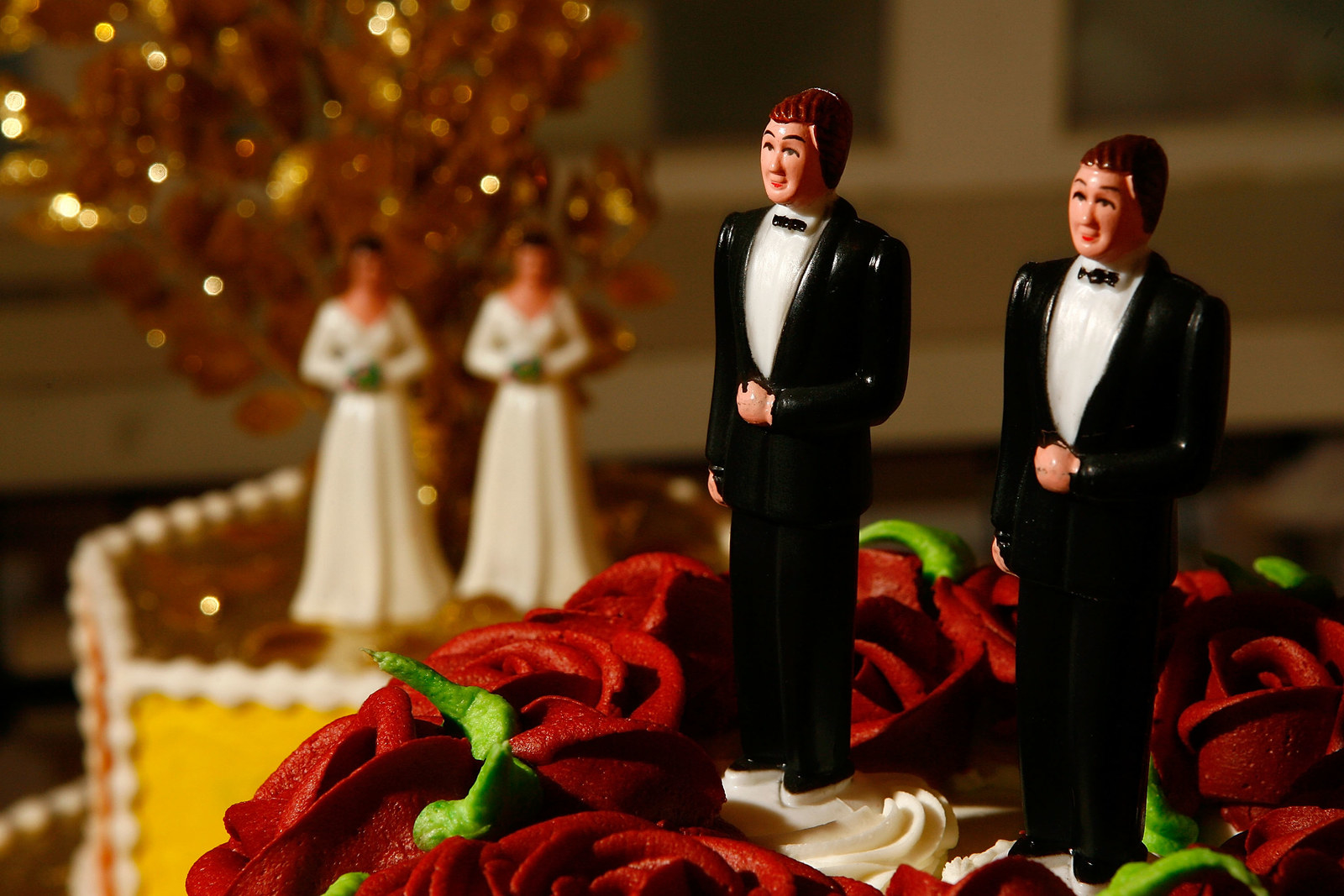
Anthony Albanese, Labor: "This bill is a result of 30 bigoted backbenchers who want to press buttons out there in the community ... I have seen a lot of bad parents. I have not seen bad same-sex parents. I do not know very many, but every same-sex couple I know really wants their child and loves their child. That should be respected, not this supposed moral nonsense. Fancy the marriage bill being debated in the House of Representatives of all places! This is a place where divorce is more common than marriages sticking together. Yet we have people here attempting to lecture this nation about the appropriate structure of the family."
Patrick Farmer, Liberal: "I ask you here today: why should we do things differently just because we can? Why should we drift away from the basics of our human values and traditions? Simply because we live in a society with advanced technology, where anything is possible and different ways of life are available, is not reason enough to change the sanctity of marriage from the way that it was meant to be."
Bob Baldwin, Liberal: "Bit by bit, the church and its teachings are being whittled away by those who do not attend church or practise religion. The perfect example of this is that more people identify Christmas with a Coca-Cola symbol of Santa Claus than they do with a nativity scene. In much the same way, marriage is becoming a symbol of a union between two people—not an institution where lives are built together and children are brought into the world and raised and loved."
Paul Neville, National: "Let me make myself clear on this matter: I am not homophobic and I am against all forms of discrimination. People should be able to live their lives in Australian society without prejudice, discrimination or bias. I am not judgmental of single-sex relationships, and I recognise that such people should be able to transfer property, superannuation rights and the like. But minorities cannot redefine marriage."
Tanya Plibersek, Labor: "Some time in the not too distant future, there will be formal recognition of same-sex couples, and the sky will not fall in, and we will not be destroyed like Sodom and Gomorrah, and life will continue. The main difference will be fewer violent or abusive attacks on gay men and lesbians, and fewer teenagers suiciding, because they will not be taught to feel shame about their sexuality as many are now."
Michael Organ, Greens: "The Marriage Amendment Act 2004 is a disgrace. It is quite clearly discriminatory ... This is 2004 we are talking about. The government seems to be living in the fifties and seems to deny everything that has happened in regard to so-called gay liberation and rights for people of other sexuality. The government has its head in the sand on this matter."
Peter Dutton, Liberal: "In this country, according to the 2001 census, 0.5 per cent of marriages were of same-sex couples. In my own electorate, in the 2001 census 53 couples were identified as being in a same-sex relationship. I do not take issue with those people. I do not suggest to them how they should run their lives, and I do not suggest to them that this government should do that. Certainly, that is not what we are doing through this legislation. What we are saying to the Australian people is that we believe the government need to enshrine the definition of marriage in legislation."
...and in the Senate.
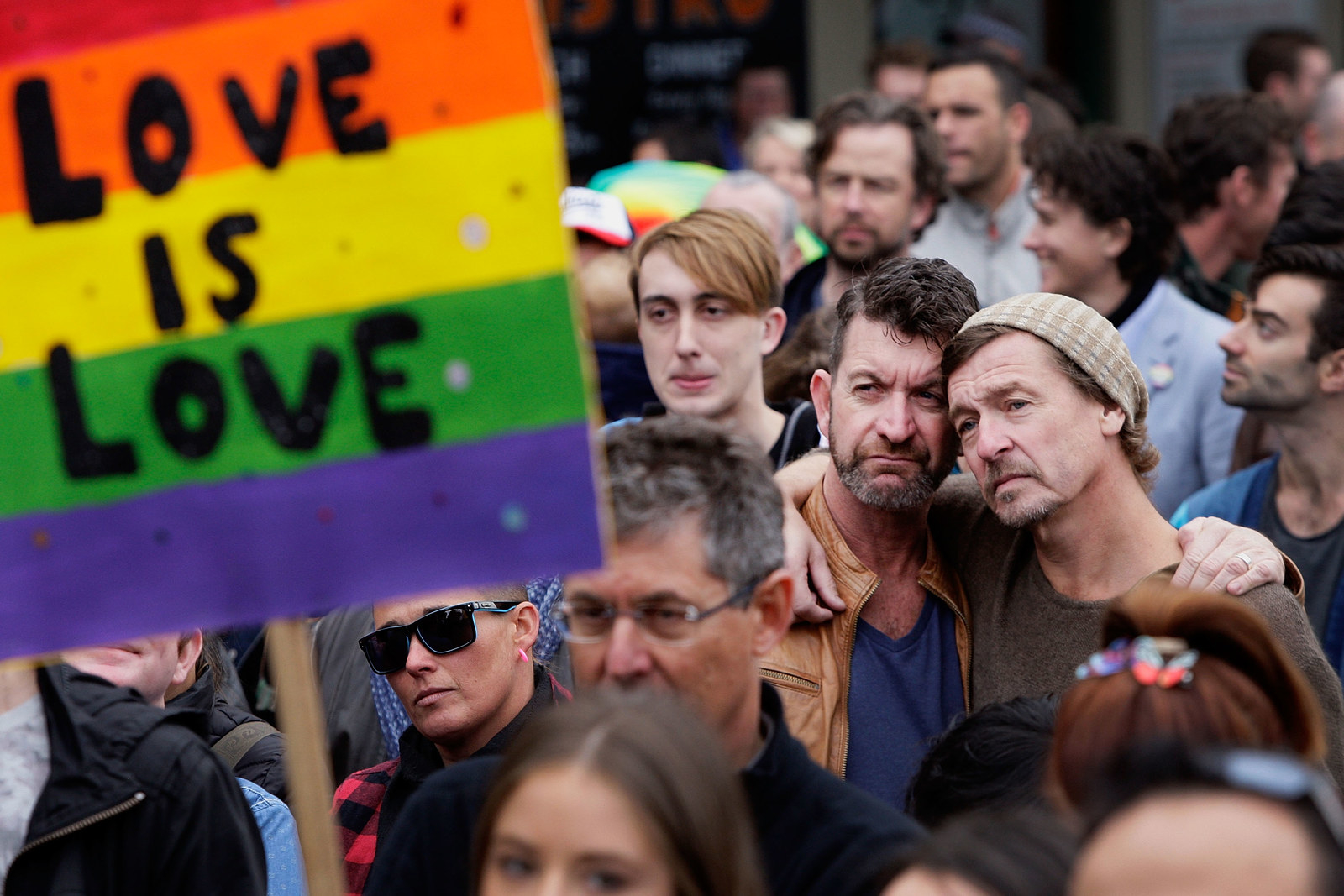
Claire Moore, Labor: "The zeal of people and groups in promoting the belief in what they call traditional marriage has in some cases crossed into real vilification and personal attack. I have been deeply sickened by comments and public forums allegedly based on the reasonable effort to raise awareness or promote certain beliefs, often using the word 'family'."
Penny Wong, Labor: "Many in our community have not witnessed the reality of lesbian and gay parenting and so are closed to the possibility that it might not be as dangerous as they might assume. That hesitation is a typically human one. It is hard to understand something which is not in the realm of your experience and not what you're used to — that goes for most of us. In fact, lesbian or gay parents want and have children for many of the same reasons that other parents do. And like all parents they do the best they can for the children they have."
Brian Greig, Australian Democrats: "I am conscious as I give this speech that I am not talking to those in this chamber or even those who might be listening elsewhere; I am speaking to researchers, students and scholars in the future — perhaps 10, 20 or 30 years down the track — who will be looking at theHansard debates over this in bewilderment, trying to understand how such an awful law could have happened."
Jacinta Collins, Labor: "I am trained theoretically as a statistician. To me, deviant means other than the norm. Unfortunately the interpretation I heard last year was that there was this enormous insult to homosexual people because they were being cast as deviants. I do not believe that that was the intent of this statement. I think the statement says that the norm for our society should be marriage as we understand it and that we need to apply care to how we deal with the issues over what is just and unjust discrimination to ensure that it does not undermine how we reinforce our norm for organising our community. That is what I think the meaning of this is."
Ron Boswell, Nationals: "Children should never be held up as trophies in an attempt to justify or enhance a lifestyle choice. Australian families are not the place for social experiments. Adults who participate in homosexual behaviour make that choice. That is their choice. As I said, I do not condone it; I do not condemn it. They make the choice for themselves but have no right to include children in that choice."
Kerry Nettle, Greens: "When I hear these issues debated in the Senate chamber, and hear some of the arguments put forward — and we have just heard many of them — I feel like I have gone through a time warp and am back in the Dark Ages."
Brian Harradine, Independent: "If we were to start changing the common understanding of marriage, you could expect to have representations made from people supporting the legal recognition of various relationships such as polygamy, polyandry, which is one woman and many men, and polyamory, which is a group marriage of varying numbers. The possibility of group marriages is not so farfetched ... A quick search of the Internet revealed at least two active polyamory groups in Australia."
Michael Forshaw, Labor: "To argue that the definition of 'marriage' should be expanded to include other forms of relationships, particularly same-sex relationships, is to destroy the definition of 'marriage'. It does not broaden it; it destroys it."
Bob Brown, Greens: "That is the next problem when you have a leader who is narrow-minded, who is divisive, who hates people of a certain category, but who says, 'Most of the rest of the people do, so I can justify that'."
Brown was then asked to withdraw his assertion that prime minister Howard "hates certain people".
Acting Deputy President: I would deem that as an unparliamentary expression, Senator Brown, and I ask you to withdraw.
Brown: No, I will not, because that is the truth. That is what is being expressed here today. This is hate legislation.
Acting Deputy President: Senator Brown, I ask you to comply with the ruling of the chair.
Brown: I will not, because I am stating the situation as I see it. I have been cogently developing this argument. This is not a Prime Minister who loves everybody regardless—
Acting Deputy President: Senator Brown, I have asked you to withdraw.
Brown: Yes, you have.
Acting Deputy President: Are you going to withdraw?
Brown: No, I will not withdraw.
Twelve years later, the situation has changed enormously.
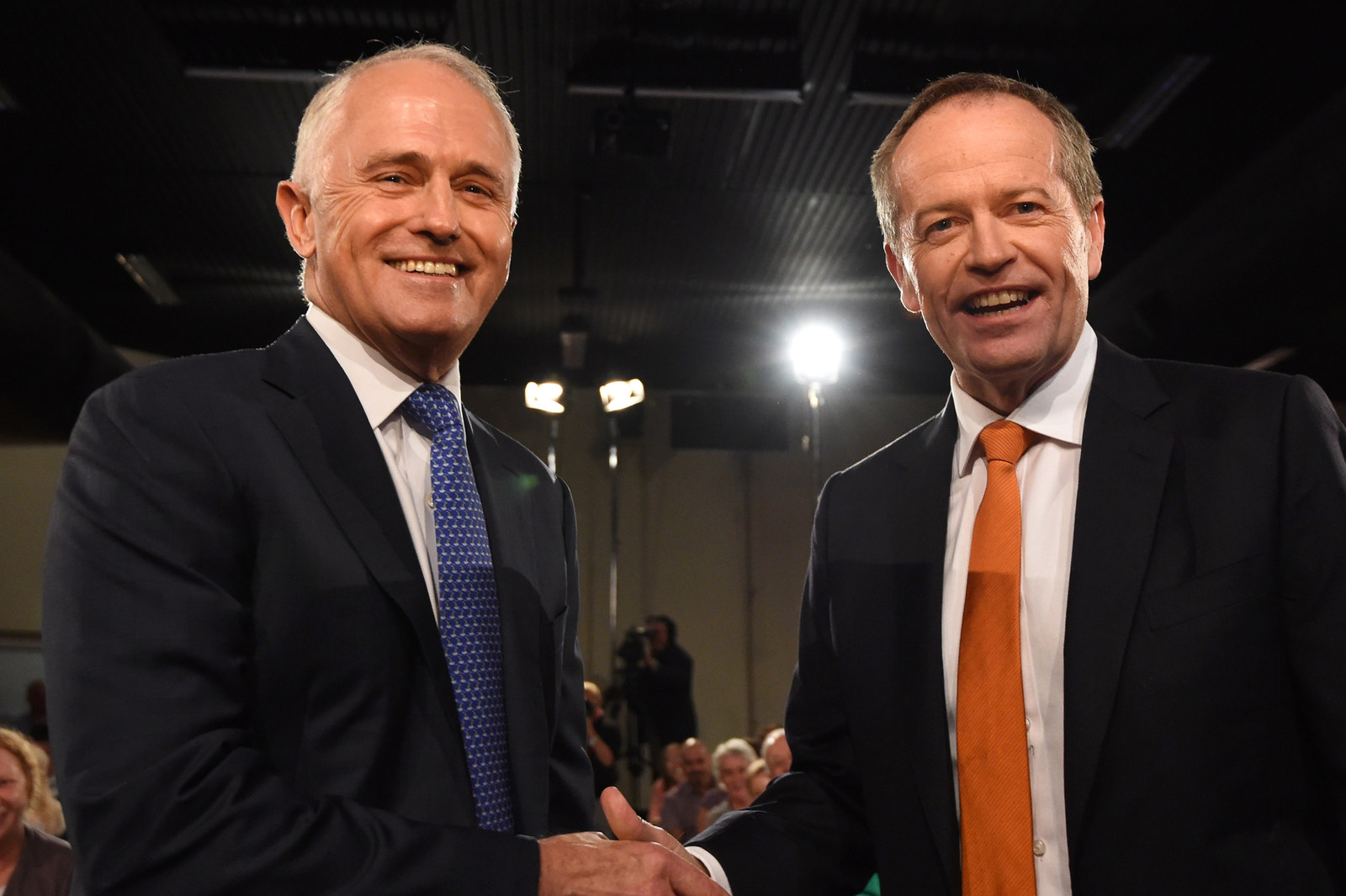
Both the House of Representatives and the Senate have a majority in favour of same-sex marriage. The prime minister and opposition leader are both fans of marriage reform. Polling shows a majority of Australians have been in favour of change since 2007.
